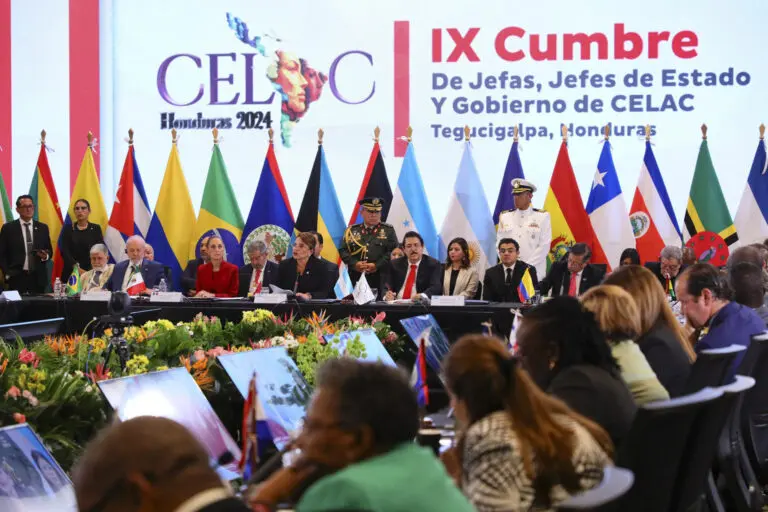At the close of the IX Summit of the Community of Latin American and Caribbean States (CELAC), the Tegucigalpa Declaration recognized the work carried out by the Republic of Honduras at the helm of the organization and welcomed Colombia’s Pro Tempore Presidency for the 2025-2026 period.
As the culmination of three days of work at the Central Bank of Honduras, which included meetings between national coordinators and foreign ministers, the IX Summit of Heads of State and Government of CELAC concluded with the signing of the Tegucigalpa Declaration, adopted by “sufficient consensus” by 30 member states of the organization.
In this way, the majority of the delegations—with the exception of Argentina, Nicaragua, and Paraguay, as indicated in the text of the official document—reaffirmed their commitment to strengthening CELAC as the political coordination mechanism that integrates all the countries of the region and is based on the heritage of declarations adopted at previous summits.
The Tegucigalpa Declaration ratifies the full validity of the so-called Proclamation of Latin America and the Caribbean as a Zone of Peace. This is based on respect for the purposes and principles of the Charter of the United Nations and international law, international cooperation, democracy and the rule of law, multilateralism, and the protection and promotion of all human rights, respect for self-determination, non-interference in internal affairs, sovereignty, and territorial integrity.
The text also rejects the imposition of unilateral coercive measures contrary to international law, including those restricting international trade.
In the framework of the IX Summit of Heads of State and Government and in light of the current challenges facing the region, they declare: pic.twitter.com/XX3XEiBodD
]The declaration indicates that it is timely and appropriate for a national of a Latin American and Caribbean state to occupy the position of Secretary-General of the United Nations. In this regard, it argues that, of the nine Secretaries-General that the UN has had to date, only one came from a state in the region and points out that the position has never been held by a woman.
In addition to underscoring the importance of arranging joint interventions by CELAC in multilateral forums on issues of common interest, the leaders expressed their appreciation to the Republic of Honduras for its work as the Pro Tempore Presidency (PPT) of the organization. In this regard, they highlight their efforts to promote high-level meetings to share efforts and experiences in the areas of food security, women, education, coffee, energy, financial cooperation, climate change, and human mobility.
On another point, the Tegucigalpa Declaration reaffirms the will to continue political dialogue to deepen CELAC’s cooperation ties with other countries and regional groups, recognizing the progress made during the meetings convened by the Honduras PPT on the sidelines of the 79th Session of the United Nations General Assembly.
Of course, the document welcomes the Republic of Colombia as a PPT member of the mecha nism for the 2025-2026 period and reaffirms its identified priorities for CELAC’s work. It specifically highlights those related to energy (energy transition and interconnection), human mobility, health and health self-sufficiency, food security, the environment and climate change, and Indigenous and Afro-descendant peoples. It also emphasizes issues of science, technology, and innovation; connectivity and infrastructure; strengthening trade and investment; transnational organized crime, as well as education and gender equality.
The Tegucigalpa Declaration reaffirms its strong support for the stability of the Republic of Haiti. It also ratifies a commitment to contribute, according to each nation’s capabilities, to support this country in its efforts, together with the international community and the United Nations, to establish a human security environment to normalize its political, economic, and social situation.


